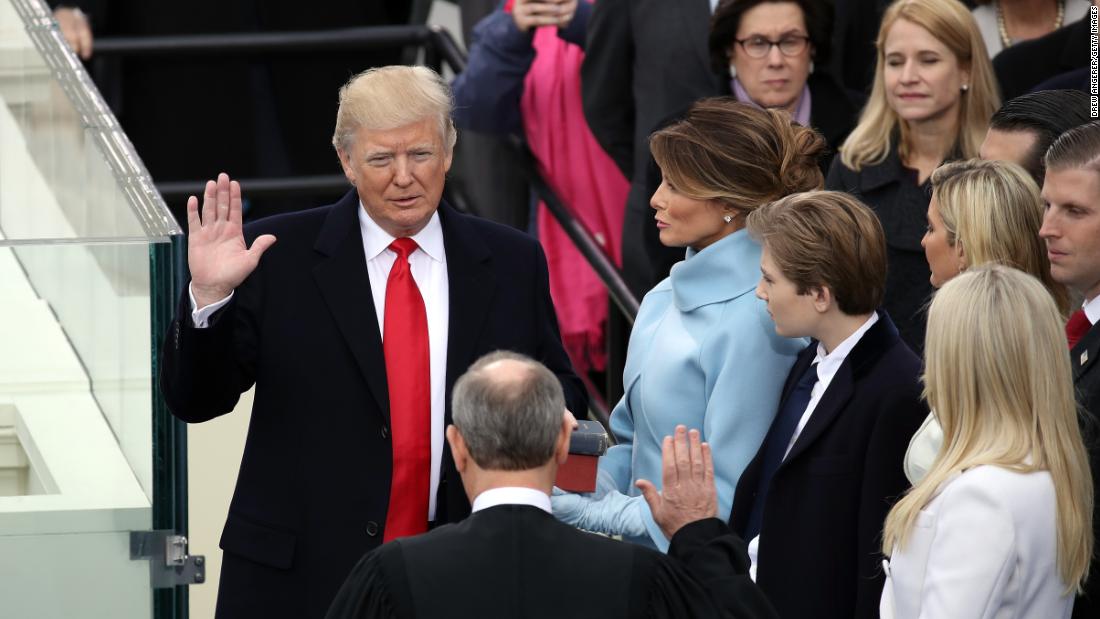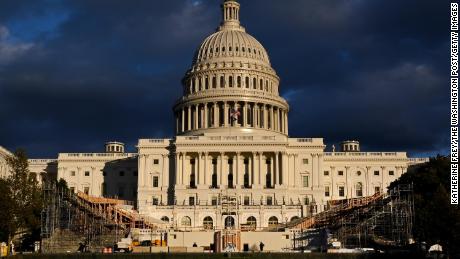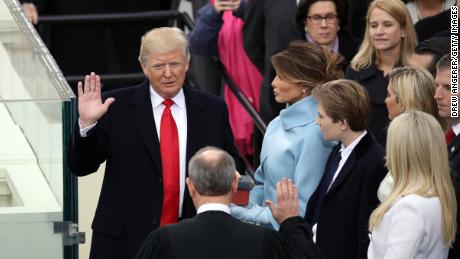Aides to Trump are encouraging him to at least consider attending Biden’s swearing-in to help preserve his potential influence going forward
The image remains implausible for a President who will likely never concede and said Sunday that nothing would convince him he lost. Yet Republicans and aides to Trump are encouraging him to at least consider attending Biden’s swearing-in, hoping his presence will both reflect well on his character and help preserve his future influence but also convince Americans the election was fair.
“I hope the President is there on Inaugural Day,” Sen. Roy Blunt, the Missouri Republican who is responsible for overseeing January’s inauguration, told CNN’s Dana Bash on “State of the Union” on Sunday.
Blunt, who declined to call Biden the president-elect, still said it was “likely” the former vice president would be sworn in on January 20. He said he was “continuing to work to see what we can do to have both the President there and have Vice President Biden there, likely sworn in on that day.”
Like others around Trump who are worried his ever-devolving conspiracies about the election could damage both his own standing and the position of Republicans going forward, Blunt appealed to the prospect that Trump could retain more influence if he departs the White House with dignity.
“I think there’s a big role for President Trump,” Blunt said. “I hope he embraces that and looks at how you move to whatever comes next for him assuming that this election works out the way it appears it will.”
Whether the outgoing president takes that advice remains unknown. Trump has performed none of the traditional steps of an outgoing commander-in-chief, including inviting Biden for a meeting in the Oval Office or even phoning him with any kind of conciliatory message.
It took weeks after Biden emerged as the president-elect for the Trump administration to formally begin the presidential transition, causing major concerns about security and planning for the coronavirus vaccine distribution.
The transition has now begun, and members of Trump’s administration are talking to the Biden team about what to expect when they enter office in January. But Trump hasn’t made any attempt to demonstrate good transition etiquette to his underlings as he continues to issue false and baseless claims about voter fraud.
Speaking in an interview on Sunday, Trump declined to offer a timeline for when he might ease up his losing battle to overturn the election results. And he admitted that even if Biden enters office, he will remain unconvinced he lost.
“My mind will not change in six months,” he said on Fox.
Six months is well past the January 20 inauguration, and a President convinced he is being unfairly ousted seems hardly likely to show up and watch someone else assuming office.
Appeals to Trump about preserving Americans’ trust in their elections hardly seems like a winning argument for a leader whose entire aim appears to be undermining faith in the Democratic process to discount the fact he lost.
Still, one person familiar with the situation says they believe Trump’s advisers will strongly encourage him to attend the January 20 inauguration, even if he doesn’t concede the election, because it would better preserve his potential influence going forward — including if he decides to run again in 2024 — if he doesn’t appear like a sore loser.
Trump told reporters Thursday that he’d already decided what he was doing on Inauguration Day. “I’ll be honest, I know the answer, but I just don’t want to say it yet,” he said. But aides viewed that as more of a way to put off the question, and did not take it to mean an actual decision had been made.
Speaking on CNN on Sunday, Blunt said he hadn’t spoken directly to Trump about attending the inauguration. But he said he was in touch with the President’s aides about the best ways to ensure he can continue to be a player in the Republican Party going forward.
“I have certainly encouraged his staff to look at the transition now, look at the opportunity in Georgia to help us win these Senate seats, look at what the President can do, if the President is leaving the White House, as he says he will do if he loses the Electoral College vote, to help us win back the House in 2022,” he said.
When Trump was sworn in four years ago, President Barack Obama and the first lady Michelle Obama welcomed him to the White House for coffee before heading to the ceremony. That followed established practice of the outgoing president accommodating the incoming one, a symbolic demonstration of the peaceful transfer of power that has defined American government for more than two centuries.
Later, Mrs. Obama admitted the day was difficult for her, particularly because Trump had spread racist lies about her husband’s birthplace. But she endured it anyway, she said, because of its importance in maintaining a peaceful transfer.
The sitting president typically departs the White House for a final time alongside the incoming one, sharing a ride in the presidential limousine to the US Capitol for the swearing-in ceremony.
Later, the newly-former president usually departs Washington for a final time aboard a military helicopter, whisked to Joint Base Andrews for a final ride aboard the aircraft that would have been called Air Force One when they were president.
Whether Trump partakes in any of those traditions is now the matter of intense speculation even among his aides, few of whom believe he would carry out any conciliatory moves as he disputes the election’s validity.
Left behind in the Oval Office is usually a letter from one president to the next, another tradition no one really knows whether Trump will uphold.
In the letter Obama wrote to Trump — reported by CNN in 2017 — he offered a piece of prescient advice that few could say has been followed.
“We are just temporary occupants of this office. That makes us guardians of those democratic institutions and traditions — like rule of law, separation of powers, equal protection and civil liberties — that our forebears fought and bled for,” Obama wrote.
“Regardless of the push and pull of daily politics,” he went on, “it’s up to us to leave those instruments of our democracy at least as strong as we found them.”
![]()






